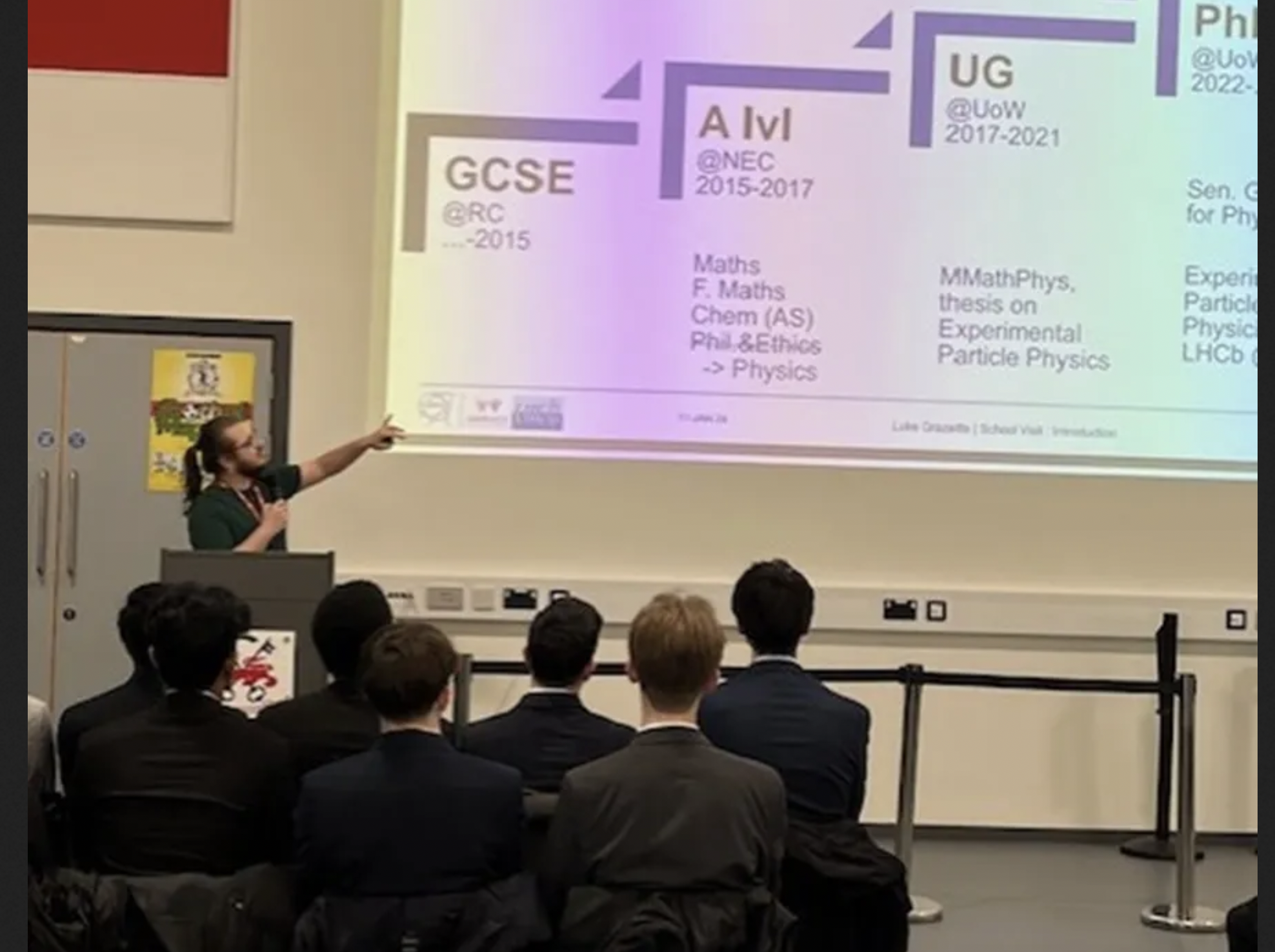Luke Grazette
I am an Elementary Particle Physics 2nd year PhD candidate, working on the LHCb Experiment, one of the experiments based on the Large Hadron Collider, CERN, Switzerland.
Supervised by Mika A. Vesterinen and Ross J. Hunter and started on 03/10/2022.
Last Updated: 26/01/24
Research:
My PhD has the focus of "Commissioning the LHCb Upgrade for W and Z physics". This physics, often referred to as "ElectroWeak Physics" is a key probe for new physics from beyond the standard model. Many things have changed between the LHCb Run2 (2015-2018) and Upgrade (2022-), with massive improvement in the amount of data and how it is processed.The record collision energy of 13.6 TeV [protons moving almost at the speed of light 99.99999% and more), and the trigger-less readout of data are expected to increase the LHCb's data-taking rate by a factor of ten!
With the Beam improvements, there's also a massive change in Software and Hardware to handle. My role is to generally "get involved". This translates to writing different event triggers, looking at early data as it becomes available and help create/test both the performance of the detector and the tools we are using to investigate it. All of this so that we get the best performance of the detector for our specific physics-case and the best chance of a precision electroweak measurement.
Small Glossary:
LHCb - The Large Hadron Collider Beauty experiment. Originally intended to only investigate flavour specifics through 'beauty' particles has proven an excellent space for many other analyses (including electroweak analyses!).
QEE - QuantumChromoDynamics, Electroweak and Exotica, one of LHCb's Physics analysis working groups
RTA - Real-Time Analysis. LHCb's core software projects related to 'online processing' of the data, i.e. during data-taking.
DPA - Data Processing and Analysis. LHCb's core software projects related to 'offline processing' of the data, i.e. after data-taking.
Event Trigger - An algorithm that determines whether an event contains a specific type of physics event. e.g. - `Hlt2SingleHighPtMuon`
`Hlt2SingleHighPtMuon` - Event selection during the second HighLevelTrigger [Hlt2] requiring a muon [conceptually similar to a 'heavy electron'] signal that has high transverse momentum [high momentum in the directions not along the beam-direction]. This is a core signature of Electroweak Physics and thus particular interest to me.
Outreach:
- Visit to Robert Clack School (Jan-2023):
Organised and spoke as an alumni to KeyStage 4 and 5 students interested in Maths and Physics. Shared the experience and perspective from attending university, having taught early-year UnderGraduates and in doing a PhD. See: Article on the visit from the School : https://www.robertclack.co.uk/alumni-visits-y11-and-sixth-form-students - Princethorpe College's trip to CERN (Jan-2023):
Met some very promising KeyStage 5 students from the local Warwick area who flew out to CERN. Spoke to them specifically about my research here at CERN and what it means to do research more broadly. The organiser of the trip had some high praise for the trip and the students' response to the talk. Including 'Your presentation was really well pitched to their level of knowledge and was clearly explained.', 'Trying to contextualise what you are doing and placing it in the real world is important and you did that really well' and finishing with 'The pupils found it extremely interesting and inspiring'.

Ongoing Contributions:
- RTA Bandwidth testing: A key constraint on the LHCb is rate and size of events being stored. The RTA BW tests allow evaluation of these numbers actively integrated into the software projects where line developers make changes to the physics event triggers. One of three developers for these tests with a specific focus on new tools and tests. See: A technical talk on the BW Testing developments given at the 111th LHCb Week, a collaboration-specific conferenceLink opens in a new window (July '23 / ONGOING).
- TCK Infrastructure Framework: A Trigger Configuration Key is an important record of how data was processed at any one time of data-taking. One of two developers creating an infrastructure around generating the TCKs, including automation of Validation, Generation, Evaluation, Comparison and Deployment of multiple TCKs at once. This simultaneously ensures both consistency and reproduciblity while reducing the burden of generating TCKs in real time. See: A technical talk on this TCK Infrastructure given at the 111th LHCb Week, a collaboration-specific conference. (Oct '23 / ONGOING)
- RTA-DPA Liaison for LHCb/QEE: A 'Trigger Liaison' is the first point of quality assurance on event-triggers for their working group. This role has included 50+ in-depth code reviews for function, form and robustness of the codebase. (Jan '23 / ONGOING / Jan '25)
Previous Contributions:
-
First LHCb/QEE 'SuperLiaison'
: Linked with the Early-Measurement Task Force, the superliaison effort improved understanding of the early LHCb Upgrade data across working groups and identified areas for improvement. Lead to being one of three contributors for QEE, and 42 Authors on an Internal Note documenting our understanding. (Aug '23 / Sept '23)
- Senior Graduate Teaching Assistant@Warwick: Laboratory Demonstration+Marking for 1st year UGs. Marking for the 2nd year UG Lab on MicroProcessing. Wrote detailed instructions and examples for future interferometry-Lab demonstrators. (Oct '22 / Mar '23)
- Health and Safety Representative@Warwick's Post-Graduate Student-Staff Liaison Committee (Oct '22 / Oct '23)
Contact Details:

Offices:
- PS0.04@Warwick,
- 13/1.042@CERN
Telephone:
- 0041 22 76 63877
E-Mail:
- luke.grazette@cern.ch
